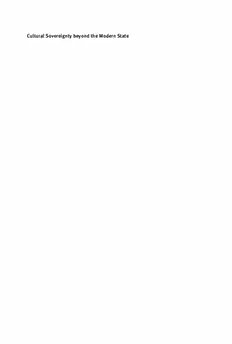
Cultural Sovereignty beyond the Modern State: Space, Objects, and Media PDF
Preview Cultural Sovereignty beyond the Modern State: Space, Objects, and Media
CulturalSovereigntybeyondtheModernState European History Yearbook Jahrbuch für Europäische Geschichte Edited by Johannes Paulmann in cooperation with Markus Friedrich and Nick Stargardt Volume 21 Cultural Sovereignty beyond the Modern State Space, Objects, and Media Edited by Gregor Feindt, Bernhard Gissibl, and Johannes Paulmann EditedatLeibniz-InstitutfürEuropäischeGeschichtebyJohannesPaulmannincooperation withMarkusFriedrichandNickStargardt Foundingeditor:HeinzDuchhardt ISBN978-3-11-067905-2 e-ISBN(PDF)978-3-11-067915-1 e-ISBN(EPUB)978-3-11-067925-0 ISSN1616-6485 DOIhttps://doi.org/10.1515/9783110679151 ThisworkislicensedundertheCreativeCommonsAttribution-NonCommercial-NoDerivatives 4.0InternationalLicense.Fordetailsgotohttp://creativecommons.org/licenses/by-nc-nd/4.0/. Chapter‘Datameetshistory:Aresearchdatamanagementstrategyforthehistorically orientedhumanities’byFabianCremer,SilviaDaniel,MarinaLemaire,KatrinMoeller,Matthias RazumandArnoštŠtanzel. LibraryofCongressControlNumber:2021934671 BibliographicinformationpublishedbytheDeutscheNationalbibliothek TheDeutscheNationalbibliothekliststhispublicationintheDeutscheNationalbibliografie; detailedbibliographicdataareavailableontheInternetathttp://dnb.dnb.de. ©2021GregorFeindt,BernhardGissibl,andJohannesPaulmann,publishedbyWalterde GruyterGmbH,Berlin/Boston. Thebookispublishedinopenaccessatwww.degruyter.com. Coverimage:“OneofGoogle’sfirstserverracks”byM.HawkseyislicensedunderCCBY2.0 Typesetting:IntegraSoftwareServicesPvt.Ltd. Printingandbinding:CPIbooksGmbH,Leck www.degruyter.com Contents GregorFeindt,BernhardGissibl,JohannesPaulmann Introduction:Culturalsovereignty–claims,formsandcontextsbeyond themodernstate 1 SilkeMende FrenchimperialpoliticsandthelongshadowofFrancophonie 21 YfaatWeiss SovereigntyinMiniature:TheMountScopusEnclave,1948–1967 38 SaimaNakutiAshipala Sovereigntyoverdiamondresources:(Re)-negotiatingcolonialcontracts inSouthernAfrica 65 SebastianLambertz Thepeople’sownmedia:WorkersrepresentationinCzechoslovak SocialistTelevision 87 JonasBrendebach Contestedsovereignties:Thecaseofthe“NewWorldInformation andCommunicationOrder”atUNESCOinthe1970s 106 IngridVolkmer Digitalsovereigntyandapproachestogoverningglobalizeddata spaces 128 GregorFeindt,BernhardGissibl,JohannesPaulmann Culturalsovereignty–Aconclusioninfourtheses 147 Forum FabianCremer,SilviaDaniel,MarinaLemaire,KatrinMoeller, MatthiasRazum,ArnoštŠtanzel Datameetshistory:Aresearchdatamanagementstrategy forthehistoricallyorientedhumanities 155 Listofcontributors 179 GregorFeindt,BernhardGissibl,JohannesPaulmann – Introduction: Cultural sovereignty claims, forms and contexts beyond the modern state Crisis? What crisis? Sovereignty, its proponents and discontents “Sovereigntyisback”–thuswastheapodicticstatementofCanadianhistorian and politician Michael Ignatieff in 2012.1 Indeed, sovereignty has made a most remarkablecomebackbothasasubjectofpoliticalandscholarlydebateaswell as a feature of political practice. The list of recent and palpable assertions of statesovereigntyinthetraditionalsenseislong,andtheyfoundperhapstheir mostsymbolicaswellastheirmostconcreteexpressionatthattraditionalsite ofstatesovereigntysincethenineteenthcenturythatistheinter-stateborder.A fewnumbersforillustration:Between2006and2015,anestimated40,000peo- plediedtryingtocrossstateborders.2Whilethenumberofborderwallswasas lowastwelvein1989–theyeartheBerlinwallcamedown–wallsandfences to clamp down and channel cross-border movements have risen to around 70 bytheyear2014.3Mostrecently,thepandemiccausedbytheSARS-CoV-2virus hastriggeredaseriesofactionsbythestatesfromclosingbordersforcitizensof othercountriesandpreventingexportsofmedicalgoodstoimposingcurfewsor restrictfreemovementwithintheirterritories.EvenwithintheEuropeanUnion, joint actions seemed to lag behind these unilateral measures so that interna- tional coordination appeared more the result of a competitive process than based on multilateral cooperation. Consequently, the global implementation ofsuchharshpoliciesofexcludingnon-nationalsduringtheSARS-CoV-2pan- demicstressedthecurrentuniversaltrajectoryofsovereignty.Iftherehasbeena crisisofstatesovereignty,asmanypoliticalanalystshaveremarkedoverthelast 1 MichaelIgnatieff,‘TheReturnofSovereignty’,in:TheNewRepublic(25January2012)https:// newrepublic.com/article/100040/sovereign-equality-moral-disagreement-government-roth. [2020-03-18] 2 ReeceJonesetal.,‘InterventionsontheStateofSovereigntyontheBorder’,in:PoliticalGe- ography59(2017),1–10,1. 3 ElisabethValleted.,Borders,fencesandwalls:Stateofinsecurity?Farnham2014,1. OpenAccess.©2021GregorFeindtetal.,publishedbyDeGruyter. Thisworkislicensed undertheCreativeCommonsAttribution-NonCommercial-NoDerivatives4.0InternationalLicense. https://doi.org/10.1515/9783110679151-001 2 GregorFeindt,BernhardGissibl,JohannesPaulmann 25years,sovereigntyhasnonethelessretaineditsdecisionist,authoritative,ex- clusiveandevenlethaledge. Yet,thereismoretosovereigntythanthecontrolofbordersandmobilities. OneofthemajormobilisingfactorsforBrexitsupporters,forexample,wasthe desiretorestrictthefreedomofmovementforCentralandEasternEuropework- ersintheUnitedKingdom.Thisargumentwas,however,chargednotonlywith thedemandtoregain“full”or“real”sovereigntyoverlegislationandjusticebut alsowithimaginariesofBritish,ormoretothepoint,Englishidentity,andthe desiretoregainformergreatnessandglobaloutreachoftenassociatedwithan unspecifiedimperialpast.4PresidentTrump’sblendof“makingAmericagreat again”and“keeping”itgreatin2020,buildingawallatthesouthernborders towards Mexico and the withdrawal from international multilateral agreements andinstitutionsfollowedasimilarifmoreopenlyracistpattern. Sovereignty has, therefore, extended well beyond the agencies and institu- tionsofmodernstates.Contestsovermigrationhavereverberatedfarbeyondthe geographic locality of borders and unleashed polarizing political debates over rightsandcitizenship,nationalidentifications,belonging,andthedegreeofso- cial and cultural plurality in virtually all European societies. The last decade has, for example, witnessed the emergence of vociferous right-wing identitar- ianmovementsacrossEuropewhooftenclaimthedefenceof“culturalidentity” already in their respective denominations.5 Adherents of these groups draw on biologically-basedideasofasocalled“ethnicpluralism”thatdrawsasharpdis- tinction between people of Western European descent and immigrants, particu- larlywithaMuslimbackground.Inwhatisoftentakenasafoundingmomentof themovement,Frenchidentitarianactivistsunfoldedabannerontherooftopof amosqueinPoitiersin2012,invokingtheyear732whenFrankishtroopsunder CharlesMarteldefeatedtheUmayyadcaliphateinthebattleofTours-Poitiersor Ma’arakat Balāṭ ash-Shuhadā’. In Germany, similar ideas became part of a conspiracy theory of an engineered “population exchange” threatening “ethnic Germans”tobecomeaminorityintheirowncountryafterwhathasbeencalleda lossofpoliticalcontrolduringtheallegedSyrianrefugeecrisisof2015. Therecently observablebacklashoftraditionalstatesovereignties, respec- tivelyclaimsofsocietalgroupstoauthoritarianformsofgovernanceandthede- fenceofallegedcultural identitysit alongside,andin partreacttowhat many 4 Seee.g.BeatriceHeuser,BrexitinHistory:SovereigntyoraEuropeanUnion?London2019 andSteveBuckledee,TheLanguageofBrexit:HowBritainTalkedItsWayOutoftheEuropean Union,London2018. 5 The Austrian branch of the Identitarian Movement, for example, was registered in 2012 underthenameVereinzurErhaltungundFörderungderkulturellenIdentität. Introduction:Culturalsovereignty 3 political observers have referred to as a widespread crisis of the sovereign na- tionstateandtheerosionofstatesovereignty.SincetheendoftheColdWar, thesecommentatorsseevariousdevelopmentsthathaveunderminedthedeci- sion-makingpowersoftheEuropeannationstates.6Forexample,thecreation of supranational institutions, such asthe International CriminalCourt in The HagueortheprogressivelyintegratedEuropeanUnion,haseffectedthetrans- ferofcorecompetenciesofnation-statesovereigntytotheseinstitutions.Deci- sionmakinginimportantpolicyfieldshasbeenshiftedfromthenationallevel ofmembercountriestoacooperativeormultilaterallevel,too.7Thepowerofthe sovereign territorial state hasbeenfurther eroded by the intensified cross-border mobilityofcapital,goods,information,andlabour.Startinginthe1960s,thiswas reflecteduponatfirstintermsofglobalinterdependenceandlaterglobalization.8 Thus,itwouldbetemptingtointerpretmanyofthephenomenaanddevel- opments to which we have just made reference as arising from the conflicting interplaybetweennation-statesandtheforcesofglobalizationandtransnation- alization. However, such a privilege of the global, respectively the national as the most relevant levels of analysis obscures the involvement of a variety of actors across several levels, as well as their contesting claims to governance anddecision-making.Similarly,placingsuchcontestationsofsovereigntytoo stronglywithinthe later partof the twentiethcenturycould mislead ustoover- emphasisethedecision-makingpowerofearlierformsofstatehood.Ratherthan 6 Fromanextensivebodyofliterature,seeSaskiaSassen,LosingControl?SovereigntyinanAgeof Globalization,NewYork2nded.1996);ManuelCastells,TheRiseoftheNetworkSociety,Chichester 2010;RichardJoyce,CompetingSovereignties,Abingdon2013;DieterGrimm,Souveränität:Her- kunftundZukunfteinesSchlüsselbegriffs,Berlin2009;andinahistoricalcontext,JamesSheehan, ‘TheProblemofSovereigntyinEuropeanHistory’,in:AmericanHistoricalReview111(2006):1–15. ThisintroductionispartlybasedonGregorFeindt,BernhardGissiblandJohannesPaulmann‘Kul- turelle Souveränität. Zur historischen Analyse von Deutungs- und Handelsmacht jenseits des Staates’,in:Idem(eds.),KulturelleSouveränität:PolitischeDeutungs‐undHandlungsmachtjenseits desStaatesim20.Jahrhundert,Göttingen2017,9–46;translationbyDonaGeyer,Munich. 7 Ontheleewaythatso-called“cunningstates”havethusgainedtostrengthentheirsovereignty through the clever exploitation of overlapping sovereignties, see Shalini Randeria, ‘Cunning States and Unaccountable International Institutions: Legal Plurality, Social Movements and RightsofLocalCommunitiestoCommonPropertyResources’,in:EuropeanJournalofSociology 44/1 (2003): 27–60; Shalini Randeria, ‘Rechtspluralismus und überlappende Souveränitäten: Globalisierungundder“listigeStaat”inIndien’,in:SozialeWelt57(2006),229–258;AndreaRe- hling,‘MateriellesKultur-undNaturerbealsObjektundRessourcekulturellerSouveränitätsan- sprüche’,in:Feindt,GissiblandPaulmann(eds.),KulturelleSouveränität,257–284. 8 MartinDeuerlein,DasZeitalterderInterdependenz.GlobalesDenkenundinternationalePo- litikindenlangen1970erJahren,Göttingen2020;PaulJamesandMartinB.Steger,‘AGeneal- ogyof“Globalization”:TheCareerofaConcept’,in:Globalizations11/4(2014),417–434. 4 GregorFeindt,BernhardGissibl,JohannesPaulmann assumingaprincipledantagonismbetweentheglobalandthenationalorthees- sentialdeclineofthemodernstate,weproposetospeakofcontestedsovereignties intheplural.Thisallowsfortheanalysisofadynamicunderstandingofclaims- anddecision-makingasaprocessthroughoutEuropeanhistory.Itissensitiveto conflicts and contradictions not only between actors but also across the levels fromtheglobaltothelocalandavarietyofsocietalfields.Necessarily,suchan understandingchallengesthereceivedideaofsovereigntyasauthorityoverdeci- sion-makingthatissolelylinkedtothemodernstate.Inconsequence,thisnotion ofsovereigntyitselfhastobetakenasaclaimratherthanagiven. In contrast to received concepts, the contributions assembled in this theme issueemployandexploretheconceptof“culturalsovereignty”inordertodenote the fluid and contested character of sovereignty. Cultural sovereignty, as we un- derstand it, isessentially a heuristic concept for the analysis of decision-making power and various efforts at self-determination and self-assertion. It takes seri- ouslythealwayscontestedcharacterofsovereigntyandtheassociatedclaimsby competingactorsandstakeholders.Indoingso,weseektoarriveatadeepened understandingofsovereigncontestationsastheymanifestthemselvesbetweenex- ternalandinternalfactorsand forces,betweenvariousactorsand groupswithin states, and over different fields from political decisions and economic powers to societal behaviour and cultural politics. The “culture” in the composite term ofculturalsovereigntydenotes,ontheonehand,aspecificdomainwithpecu- liarresourcesthatmaybeemployedtoclaimsovereignty.Ontheotherhand, ourapproachgoesbeyondthislimitedunderstandingandconceivespowerand authorityasculturalpracticesthatarebothsituatedinandmediatedthroughpo- litical,societal,economicandculturalspheres.Thestateaswellassocietalactors likecompanies,socialmovements,themediaorscholarswereengagedinclaims oversovereigntiesandtheirdifferentmanifestationsandinterpretations. Inthefollowing,wewill,first,discussrecentcontributionstorethinkingsov- ereigntyand,second,bringforwardculturalsovereigntyasa“heuristictool”.Fi- nally,wewillintroducethechapterstothisvolumeand,intheconclusion,carve out their contribution to cultural sovereignty as a concept of analysis, which offers a heuristic for the historical analysis of sovereignty practices beyond thescopeofthenationstate. Rethinking sovereignty beyond the modern state Inrecentyears,arichliteraturehasobservedthevariousforcesunderminingsov- ereignty. These studies illustrate that sovereignty is changed if not challenged
